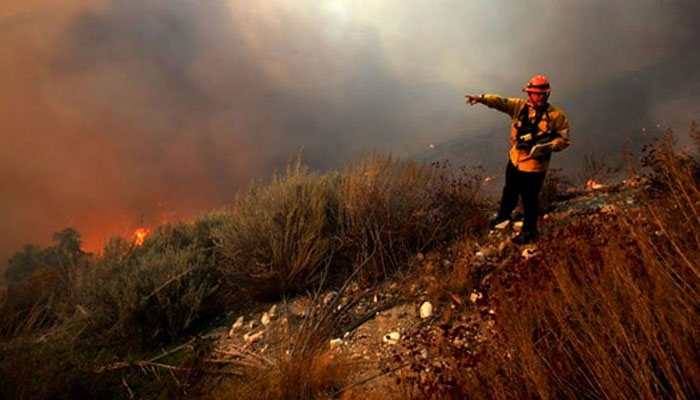LOS ANGELES: Some 50,000 people were ordered to flee their homes north of Los Angeles on Thursday as a fast-moving wildfire driven by high winds erupted and raged out of control. The so-called Tick Fire near Santa Clarita, about 40 miles (65 kilometers) north of Los Angeles, broke out in the early afternoon and quickly consumed 5,000 acres (2,023 hectares), fire officials said.
The blaze burned several homes and structures and forced the closure of a major highway and a number of roads, as some 500 firefighters backed by air tankers and helicopters battled the flames. There were no immediate reports of injury. “We are urging everybody to evacuate at this time,” a spokesman for the fire department said.
The fire erupted as much of the state was under a red flag warning because of gusty winds, high temperatures and low humidity which make for perfect conditions for wildfires. In northern California wine country, some 2,000 people were ordered to evacuate after a brush fire erupted late Wednesday, quickly growing from a blaze of a few hundred acres into a 16,000-acre inferno, California fire officials said.
About 500 responders battled the fire fed by wind gusts topping 70 miles per hour (113 kilometers per hour). Mandatory evacuation orders were issued for the community of Geyserville and nearby vineyards after the fire started in a mountainous area and quickly spread, crossing a highway and moving toward homes, the Sonoma County Sheriff’s Office said.
“If you’re in Geyserville, leave now,” the sheriff’s office advised, citing an extraordinary threat to life and property. Winds out of the north were driving the fire as firefighters struggled to save homes.
By early evening, the fire was five percent contained and several structures had burned, fire officials said. The blaze — 75 miles (120 kilometers) north of San Francisco — came amid official warnings that much of northern California and parts of the south were under imminent threat of fires into Friday because of blustery, dry weather and high temperatures.
Another brush fire in San Bernardino County, about 60 miles east of Los Angeles, also prompted evacuation orders as it quickly burned 75 acres. Power was cut to some 180,000 customers in the northern part of the state Thursday and similar preemptive shutoffs affected thousands of customers further south due to conditions that are ripe for wildfires.
Power companies warned that additional power cuts could be ordered to reduce the risk of accidental fires. The strong winds in the north were expected to subside Friday but are forecast to pick up again on Sunday, the National Weather Service warned. Many residents of Geyserville said they barely had time to gather their belongings as the monster fire quickly approached the town, with embers igniting fires throughout the region.
“We thought we were a couple of miles from the fire,” Dwight Monson, 68, told the Los Angeles Times. “But guess what — the winds.” He said by the time his family got in their cars and escaped to the valley below, the flames were on the edge of their ranch. PG&E, the state’s biggest utility, said in a statement that it had informed regulators that a jumper on a transmission tower near where officials said the fire had started was broken.
The company — which has been held responsible for numerous wildfires in the state — said that even though power to nearly 28,000 customers in Sonoma County, including Geyserville, had been shut down on Wednesday, some of the high-voltage transmission lines were still operating when the fire broke out.
“We relied on the protocol and we still, at this point, do not know what exactly happened,” PG&E CEO and president Bill Johnson told a news conference. This week’s fires have erupted as the state is still recovering from deadly wildfires in 2017 and 2018 that killed more than 100 people. The fires have been fueled by years of drought and dry vegetation.
“This is an emotional time for many people,” Sonoma County Sheriff Mark Essick told a news conference Thursday. “It’s only been two years since the fires that devastated our community. For many this will be a very stressful and anxious time.” AFP







